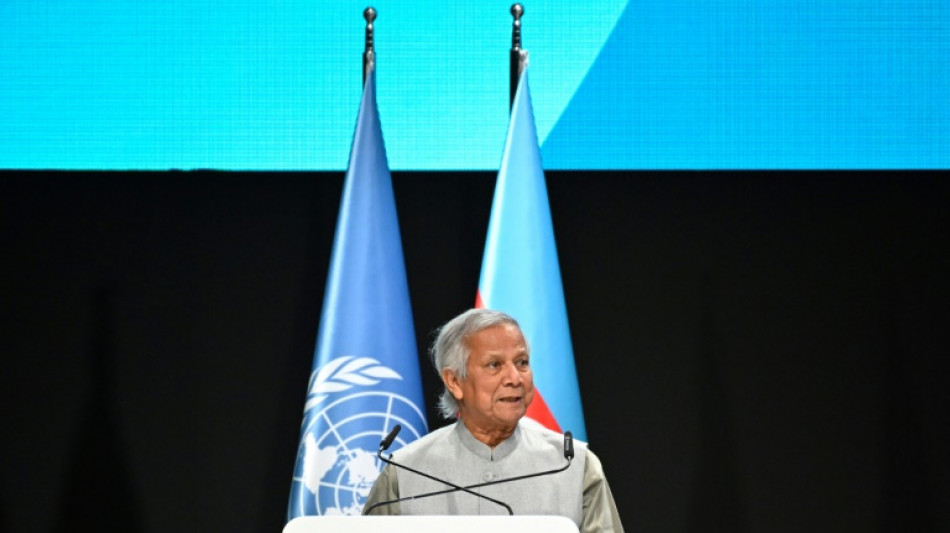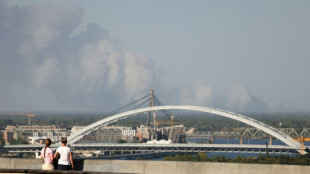
-
 Verstappen wins fourth consecutive Formula One world title
Verstappen wins fourth consecutive Formula One world title
-
Survivors, sniffing dogs join anti-mine march at Cambodia's Angkor Wat

-
 Far right eye breakthrough in Romania presidential vote
Far right eye breakthrough in Romania presidential vote
-
Jaiswal slams majestic 161 but Australia fight back in Perth

-
 Edinburgh's alternative tour guides show 'more real' side of city
Edinburgh's alternative tour guides show 'more real' side of city
-
IPL teams set to splash the cash at 'mega-auction' in Saudi Arabia

-
 Olympics in India a 'dream' facing many hurdles
Olympics in India a 'dream' facing many hurdles
-
Wounded Bangladesh protesters receive robotic helping hand

-
 Majestic Jaiswal 141 not out as India pile pain on Australia
Majestic Jaiswal 141 not out as India pile pain on Australia
-
Giannis, Lillard lead Bucks over Hornets as Spurs beat Warriors

-
 Juan Mata agent slammed as 'cowardly' by angry A-League coach
Juan Mata agent slammed as 'cowardly' by angry A-League coach
-
Marta inspires Orlando Pride to NWSL title

-
 Palestinian pottery sees revival in war-ravaged Gaza
Palestinian pottery sees revival in war-ravaged Gaza
-
Main points of the $300 billion climate deal

-
 Robertson wants policy change for overseas-based All Blacks
Robertson wants policy change for overseas-based All Blacks
-
Israel retreat helps rescuers heal from October 7 attack

-
 Afghan women turn to entrepreneurship under Taliban
Afghan women turn to entrepreneurship under Taliban
-
Mounting economic costs of India's killer smog

-
 At climate talks, painstaking diplomacy and then anger
At climate talks, painstaking diplomacy and then anger
-
Uruguayans head to polls with left hoping for comeback

-
 Trump's mass deportation plan could end up hurting economic growth
Trump's mass deportation plan could end up hurting economic growth
-
Iran director in exile says 'bittersweet' to rep Germany at Oscars

-
 US consumers to bargain hunt in annual 'Black Friday' spree
US consumers to bargain hunt in annual 'Black Friday' spree
-
Cheers, angst as US nuclear plant Three Mile Island to reopen

-
 Scientists seek miracle pill to stop methane cow burps
Scientists seek miracle pill to stop methane cow burps
-
Australia ditches plans to fine tech giants for misinformation

-
 Developing nations slam 'paltry' $300 bn climate deal
Developing nations slam 'paltry' $300 bn climate deal
-
Red Bulls win 'Hudson River derby' to reach conference final

-
 Neuville wins world title after Tanak crashes at Rally Japan
Neuville wins world title after Tanak crashes at Rally Japan
-
Neuville wins world rally title after Tanak crashes in Japan

-
 Colapinto cleared for Las Vegas GP despite heavy crash
Colapinto cleared for Las Vegas GP despite heavy crash
-
'Smiling One' Amorim vows he has ruthless streak Man Utd need

-
 Marseille down Lens to stay in touch with Ligue 1 leaders, Lyon draw
Marseille down Lens to stay in touch with Ligue 1 leaders, Lyon draw
-
New Zealand beat 'proud' Italy in Cane's Test farewell

-
 Barca collapse in Celta draw without Yamal, Simeone hits milestone
Barca collapse in Celta draw without Yamal, Simeone hits milestone
-
Thailand's Jeeno equals Yin for lead at LPGA Tour Championship

-
 New Zealand beat Italy in Cane's Test farewell
New Zealand beat Italy in Cane's Test farewell
-
Marseille down Lens to stay in touch with Ligue 1 leaders, Lyon held to draw

-
 Liga leaders Barca suffer late collapse in Celta draw
Liga leaders Barca suffer late collapse in Celta draw
-
Retegui fires Atalanta top of Serie A ahead of Inter

-
 Greaves hits maiden Test century as West Indies dominate Bangladesh
Greaves hits maiden Test century as West Indies dominate Bangladesh
-
Venezuela opposition calls for mass anti-Maduro protest on Dec. 1

-
 'Fragile' Man City in uncharted territory, admits Guardiola
'Fragile' Man City in uncharted territory, admits Guardiola
-
Erasmus hails Springbok strength in depth after thrashing Wales

-
 Postecoglou calls for consistent Spurs after Man City rout
Postecoglou calls for consistent Spurs after Man City rout
-
'We've never lived this situation' admits Guardiola

-
 Lebanon says more than 55 killed in Israeli strikes
Lebanon says more than 55 killed in Israeli strikes
-
'We've never lived this situation' admits Guardiola as Man City lose five in a row

-
 Under-fire Gatland 'motivated' to continue as Wales coach
Under-fire Gatland 'motivated' to continue as Wales coach
-
South Africa send Wales crashing to 87-year low in Test rout


'Very humiliating': Bangladesh's Yunus seethes over climate cash fight
In the three months since becoming Bangladesh's interim leader following a student-led revolution, Muhammad Yunus has endured political turmoil, impatient cries for elections, and destructive flooding across the low-lying nation.
Now, the Nobel Peace Prize winner has been thrust into a brawl over money to help poorer countries deal with climate change -- and he is not pleased about it.
The 84-year-old micro-finance pioneer, who took over after the toppling of autocratic leader Sheikh Hasina in August, likened the haggling at the UN COP29 climate summit to a "fish market".
"I think that's very humiliating, for nations to come and ask for money to fix... (the) problem that others caused for them," Yunus told AFP in an interview in Azerbaijan, which is hosting the talks.
"Why should we be dragged here to negotiate? You know the problem."
Nations hope to land a deal at COP29 that boosts funding for climate action in developing nations like Bangladesh, which are least responsible for global warming, but most at its mercy.
Some want $1 trillion a year to cover the enormous cost of shifting their economies to clean energy, and adapting to ever-more erratic and extreme weather.
But rich countries -- whose rise to prosperity and associated carbon emissions have driven global warming -- are reluctant to commit such large sums and want others to chip in.
The talks have hit a wall, frustrating leaders of climate-imperilled nations who left behind populations in dire straits to travel to Baku.
Among them is Yunus, who said his riverine homeland had been smashed by six punishing floods -- "each one worse than the previous" -- in the short time since he took over.
Hundreds of thousands of people were forced into emergency shelters in the floods, which also destroyed rice crops.
- 'You figure it out' -
Bangladesh is among the world's most vulnerable nations to climate change, with large areas made up of deltas where the Ganges and the Brahmaputra rivers wind towards the sea.
The country of 170 million is particularly at risk of devastating floods and cyclones -- disasters that only stand to accelerate as the planet keeps warming.
Yunus said it was "not a secret" that rich nations would have to help poorer ones adapt and they should "figure out how much is needed -- not me".
"This is not something we are demanding out of your generosity. We're asking because you are the cause of this problem," he said bluntly.
Yunus said juggling a peaceful democratic transition and a floods response was "difficult" enough and adding a flight to Baku to feud over climate finance didn't help.
Impatience for elections in Bangladesh has gained pace since Hasina's ouster, and the silver-haired technocrat said he shared concerns for peace and security in the nation of 170 million.
A free and fair vote would come as promised, he said, but the speed of democratic reforms "will decide how quick the election will be".
He wouldn't offer a date or timeline, but said the caretaker administration was hoping to build "a quick consensus".
"We are the interim government, so our period should be as short as possible," he said.
G.Schulte--BTB



